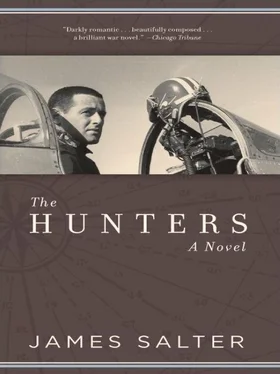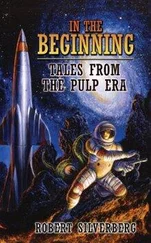It was colder inside that vault than he remembered. He turned on the lights as he went in. Outside the windows it was full night, frozen and clear. Shivering a little, he took clean clothes from his bag and stuffed everything dirty into a compartment that was already almost full. Although he had been frugal with his laundry, he was close to running out. There was one clean shirt remaining, besides the one he had withdrawn to wear, and two changes of everything else. The only plentiful item was handkerchiefs. He put on his uniform, then his overcoat, and left the room, not bothering to turn out the light. He looked at his watch. It was almost seven, and he was very hungry. He strolled down the empty cement corridor, descended a flight of stairs, and walked out.
The night was illuminated by a bright moon that paled the stars, but despite this there was a thin haze, as if of frost, over everything. The buildings gleamed artificially through it. Every light was crowned with a delicate coronet. His footsteps splintered along the sidewalk, and his breath streamed in the air like silver evanescent smoke. This was a strange earth, Japan, and a brilliantly portentous heaven that covered it. He felt as if he were walking through a page of history. It was a disquieting sensation. He was moving in a current of destiny, quite alone, as alone as a man dying.
He had come a long way to this place. In the stale, crowded cabin of a transport he had sat for hour after hour while the night became day and the miles fell behind, unnoticed, so that it was like traveling through nothing but unbending time. From one horizon of the world to the other he had come, across endless waters, feeling continually more mortal and insignificant as he went, like a swimmer moving further and further from shore. Now he did not look back. The trip behind was a bridge gone. There was no returning. He had crossed to the war, and a great sense of excitement was on him.
Men often know what their destiny is to be, and perhaps Cleve knew his. If not, perhaps his eyes alone had seen it, for they were unusual eyes. They could be deeply, almost sadly, receptive, or as impervious as marbles. They were the most striking feature in a face that had composure, but of the mildest sort. Cleve wore no mask against the world. He had a mouth that smiled easily, a brittle nose, and a certain renown that seven years in fighters had given him.
It was a reputation based on achievement. One year, in the gunnery meet at Las Vegas, he had taken the individual air-to-air honors. He’d been on an acrobatic team, too, sweating doggedly through the monomania of formation loops and rolls too close to the ground. Afterward, there had been congratulations by generals and continued performances at the bar in the clubs, with more pilots than he could remember standing around listening to the talk. There was always a crowd, and singing and drinking. It was an exciting business, and nice to be pointed out.
It had gone quickly though, like the year of a first love, the delirious April suddenly a cool November. It had been a life like being at school, regulated and protected. There had been the moments of danger that could not be looked at too closely, and all the rest had been a swift passage of days. He was a natural flyer, not a cultivated one, and he had always known it: the ability had been there from the start; the amount of effort required to convert it into excellence had been small. It was like being a boy with a good memory in a history class. That was something you could be proud of, but never haughty.
He would sometimes recall, as if it had happened to another person, the compulsion to press close to death, to feel the purity that followed. He had always been respectful of the inner conquests of men and the rarefied, ascetic world they occurred in. He had traveled that world for a while, accomplishing he was not sure what, unless it was that he had learned a little of silence and perhaps devotion.
Friends on the outside were always asking why he stayed in, or telling him he was wasting himself. He had never been able to give an answer. With the fresh shirt on his shoulders still cold as ice, chilled from an hour in an unheated radar compartment at forty thousand feet between Long Beach and Albuquerque, the marks from the oxygen mask still on his face, and on his hands the microscopic grit of a thousand-mile journey, he had tried to find an answer sitting alone at dinner in the club filled with administrative majors and mothers talking about their children, but he never could. In his mind he carried Saturdays of flying, with the autumnal roar of crowds on the radio compass and the important stadiums thirty minutes apart and button-small, the wingmen like metallic arrows poised in the air above a continent, the last sunlight slanting through the ground haze, and cities of concrete moss; but never any reasonable reply. Or, sick of the stars and bored with speed on those nights in the great black sea, the surf of which was cities bubbling on the wave, listening to the others who were up, two unseen killers perhaps, calling themselves Butcher Red and seeking themselves in the darkness, he had tried to think of one—brief, understandable—but never could. It was all a secret life, lived alone.
One thing he was sure of: this was the end for him. He had known it before he came. He was thirty-one, not too old, certainly; but it would not be long. His eyes weren’t good enough any more. With an athlete, the legs failed first. With a fighter pilot, it was the eyes. The hand was still steady and judgment good long after a man lost the ability to pick out aircraft at the extreme ranges. Other things could help to make up for it, and other eyes could help him look, but in the end it was too much of a handicap. He had reached the point, too, where a sense of lost time weighed on him. There was a constant counting of tomorrows he had once been so prodigal with. And he found himself thinking too much of unfortunate things. He was frequently conscious of not wanting to die. That was not the same as wanting to live. It was a black disease, a fixation that could ultimately corrode the soul.
He walked past some tennis courts with ice shining in patches on them and ivy like old string clinging to the fences, then came to the entrance of the club. It was warm inside. He looked about for a minute, feeling lost in the crowded room. Somebody against the far wall was beckoning to him. It was the lean man, eating dinner at one of the tables. Cleve sat down beside him.
“Have you eaten yet?” the lean man asked.
“No.”
“It’s a good meal tonight. Pork chops.”
Cleve glanced at the menu and flipped it aside.
“Don’t you like pork chops?”
“This waiting around is getting on my nerves.”
“It can do that. I don’t take you to be too high-strung, though.”
“I’ll be that way before long.”
“How many days have you been here?”
“Four.”
“I’ve been here three weeks,” the lean man said. “Three weeks and three days, if you want to count it out.”
“Three weeks?” Cleve was astonished. “My God, I hope you’re an exception.”
“There wasn’t much I could do about it. I came down with some kind of virus just after I got here, caught it in San Francisco I expect, because I was sick enough on the trip across. They put me right in the hospital. I just got out a few days ago. I’m due to see the doctor again tomorrow morning; and if he thinks I’m all right, he’ll clear me to get my orders to go on to Korea.”
While Cleve ate, the lean man talked in his tart, unruffled manner, mostly about his experiences in the hospital. He had been given a fresh pair of pajamas every three days, he said, and after a while he began to develop a real interest in whether or not he would be able to complete his convalescence before he received any with a single button on them.
Читать дальше












